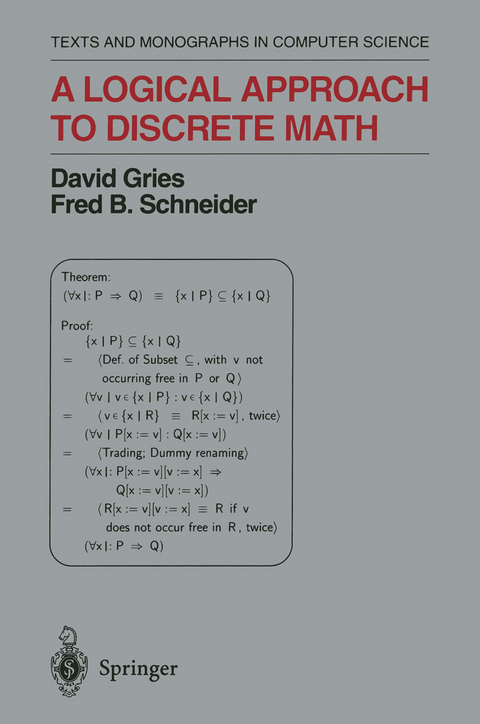
A Logical Approach to Discrete Math
Springer-Verlag New York Inc.
978-1-4419-2835-1 (ISBN)
This text attempts to change the way we teach logic to beginning students. Instead of teaching logic as a subject in isolation, we regard it as a basic tool and show how to use it. We strive to give students a skill in the propo sitional and predicate calculi and then to exercise that skill thoroughly in applications that arise in computer science and discrete mathematics. We are not logicians, but programming methodologists, and this text reflects that perspective. We are among the first generation of scientists who are more interested in using logic than in studying it. With this text, we hope to empower further generations of computer scientists and math ematicians to become serious users of logic. Logic is the glue Logic is the glue that binds together methods of reasoning, in all domains. The traditional proof methods -for example, proof by assumption, con tradiction, mutual implication, and induction- have their basis in formal logic. Thus, whether proofs are to be presented formally or informally, a study of logic can provide understanding.
0 Using Mathematics.- 1 Textual Substitution, Equality, and Assignment.- 2 Boolean Expressions.- 3 Propositional Calculus.- 4 Relaxing the Proof Style.- 5 Applications of Propositional Calculus.- 6 Hilbert-style Proofs.- 7 Formal Logic.- 8 Quantification.- 9 Predicate Calculus.- 10 Predicates and Programming.- 11 A Theory of Sets.- 12 Mathematical Induction.- 13 A Theory of Sequences.- 14 Relations and Functions.- 15 A Theory of Integers.- 16 Combinatorial Analysis.- 17 Recurrence Relations.- 18 Modern Algebra.- 19 A Theory of Graphs.- 20 Infinite Sets.- References.- Theorems of the propositional and predicate calculi.
"This is a rather extraordinary book, and deserves to be read by everyone involved in computer science and - perhaps more importantly - software engineering. I recommend it highly... If the book is taken seriously, the rigor that it unfolds and the clarity of its concepts could have a significant impact on the way in which software is conceived and developed." - Peter G. Neumann
| Reihe/Serie | Monographs in Computer Science |
|---|---|
| Zusatzinfo | XVI, 516 p. |
| Verlagsort | New York, NY |
| Sprache | englisch |
| Maße | 155 x 235 mm |
| Themenwelt | Informatik ► Theorie / Studium ► Algorithmen |
| Informatik ► Weitere Themen ► Hardware | |
| Mathematik / Informatik ► Mathematik ► Angewandte Mathematik | |
| ISBN-10 | 1-4419-2835-9 / 1441928359 |
| ISBN-13 | 978-1-4419-2835-1 / 9781441928351 |
| Zustand | Neuware |
| Haben Sie eine Frage zum Produkt? |
aus dem Bereich


